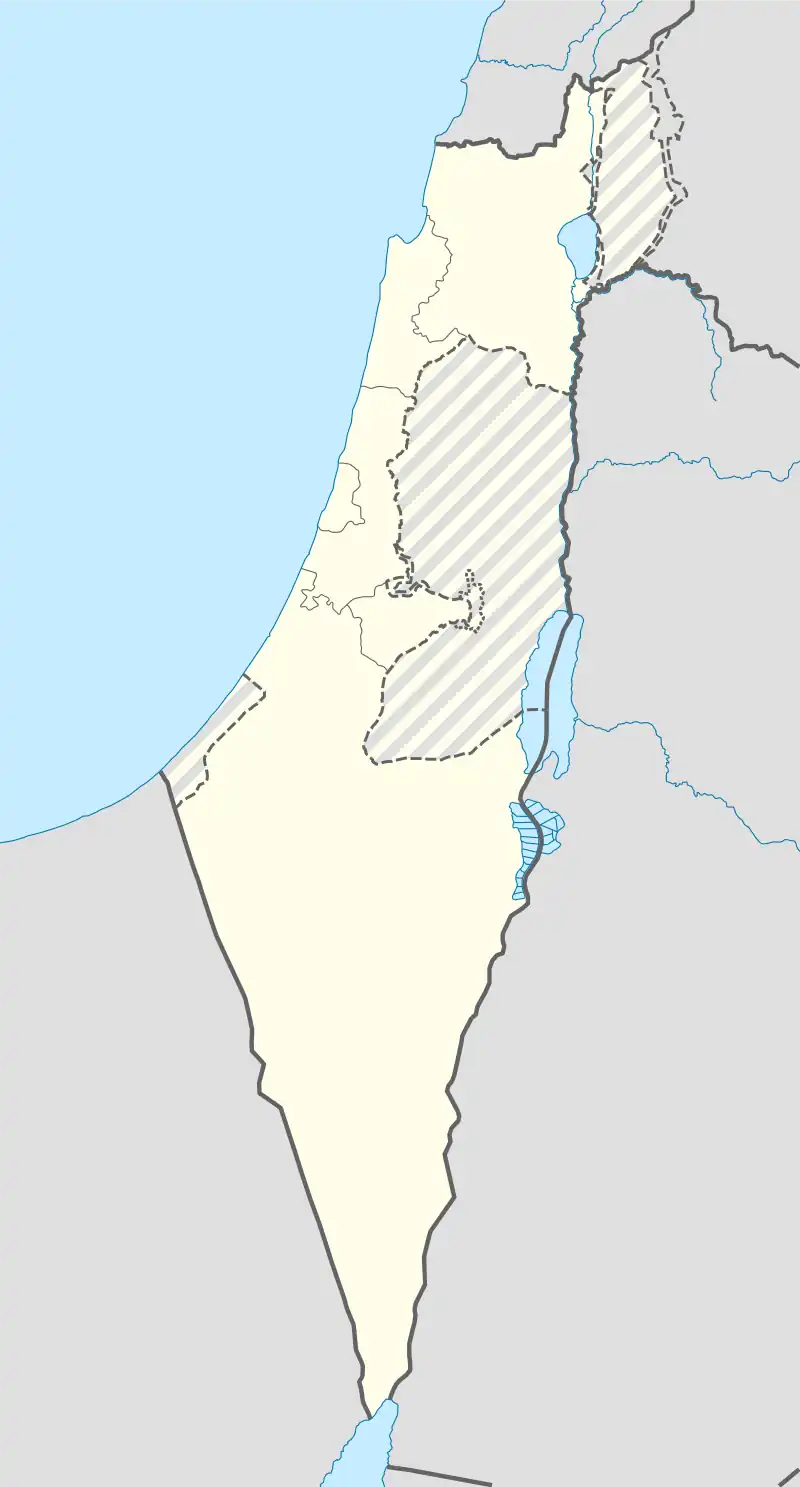Azor
| |
|---|---|
Local council (from 1951) | |
| Hebrew transcription(s) | |
| • ISO 259 | ʔazor |
 | |
 Azor  Azor | |
| Coordinates: 32°1′20.03″N 34°48′40.47″E / 32.0222306°N 34.8112417°E | |
| Country | Israel |
| District | |
| Founded | 1948 |
| Government | |
| • Head of Municipality | Arie Pechter |
| Area | |
| • Total | 2,415 dunams (2.415 km2 or 597 acres) |
| Population (2022)[1] | |
| • Total | 13,547 |
| • Density | 5,600/km2 (15,000/sq mi) |
| Website | www.azor.muni.il |

Azor (Hebrew: אָזוֹר, Arabic: أزور) (also Yazur) is a small town (local council) in the Tel Aviv District of Israel, on the old Jaffa-Jerusalem road southeast of Tel Aviv. Established in 1948 on the site of the ethnically cleansed Palestinian village of Yazur, Azor was granted local council status in 1951.[2] In 2021 it had a population of 13,474,[1] and has a jurisdiction of 2,415 dunams (2.415 km2; 0.932 sq mi).[3]
Etymology
Azor was named for the ancient city of Azur (lit. mighty, heroic), preserved in the name of the Palestinian village of Yazur.[2] The council of the new village named it Mishmar HaShiv'a ('Guardian of the Seven') in honour of seven Jewish soldiers killed near there in 1948, but the government committee in charge of assigning names forced them to change it to Azor on the grounds that preserving Biblical names was more important.[4] However, another new village nearby was later named Mishmar HaShiv'a.[4]
History
the 16th century, Haseki sultan endowed the lands of Yazur to its Jerusalem soup kitchen.[5] During the 18th and 19th centuries, the area belonged to the Nahiyeh (sub-district) of Lod that encompassed the area of the present-day city of Modi'in-Maccabim-Re'ut in the south to the present-day city of El'ad in the north, and from the foothills in the east, through the Lod Valley to the outskirts of Jaffa in the west. This area was home to thousands of inhabitants in about 20 villages, who had at their disposal tens of thousands of hectares of prime agricultural land.[6]
For further information, see on the page of the preceding Palestinian village, Yazur.
Notable residents
- Shelly Krolitzky (born 1999), tennis player
- Matvey Natanzon, backgammon player[7]
- Margalit Tzan'ani, singer and tv personality[8]
Main sights
- Azor Museum, archaeological museum
References
![]() Media related to Azor at Wikimedia Commons
Media related to Azor at Wikimedia Commons
- 1 2 "Regional Statistics". Israel Central Bureau of Statistics. Retrieved 22 February 2023.
- 1 2 "Azur (Israel)". Retrieved 2 April 2015.
- ↑ "Local Authorities in Israel 2005, Publication #1295 - Municipality Profiles - Azor" (PDF) (in Hebrew). Israel Central Bureau of Statistics. Archived from the original (PDF) on 2016-03-03. Retrieved 2008-04-17.
- 1 2 Meron Benvenisti (2002). Sacred Landscape. University of California Press. pp. 32–33.
- ↑ Marom, Roy (2022-11-01). "Jindās: A History of Lydda's Rural Hinterland in the 15th to the 20th Centuries CE". Lod, Lydda, Diospolis. 1: 8–9.
- ↑ Marom, Roy (2022). "Lydda Sub-District: Lydda and its countryside during the Ottoman period". Diospolis - City of God: Journal of the History, Archaeology and Heritage of Lod. 8: 103–136.
- ↑ Raffi Khatchadourian (May 13, 2013). "The Chaos of the Dice". The New Yorker. Retrieved May 14, 2013.
- ↑ Don't mess around with me, Haaretz
